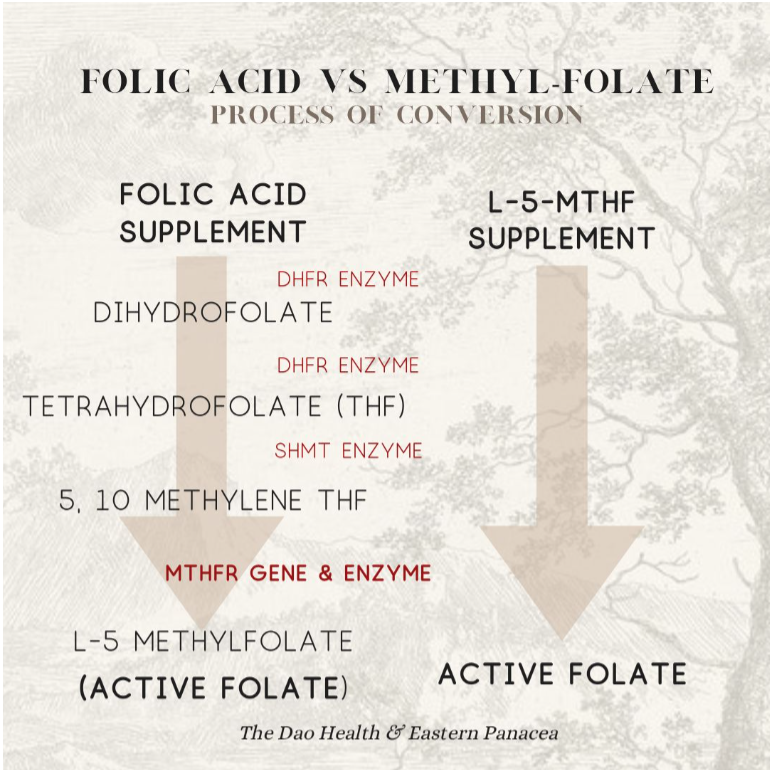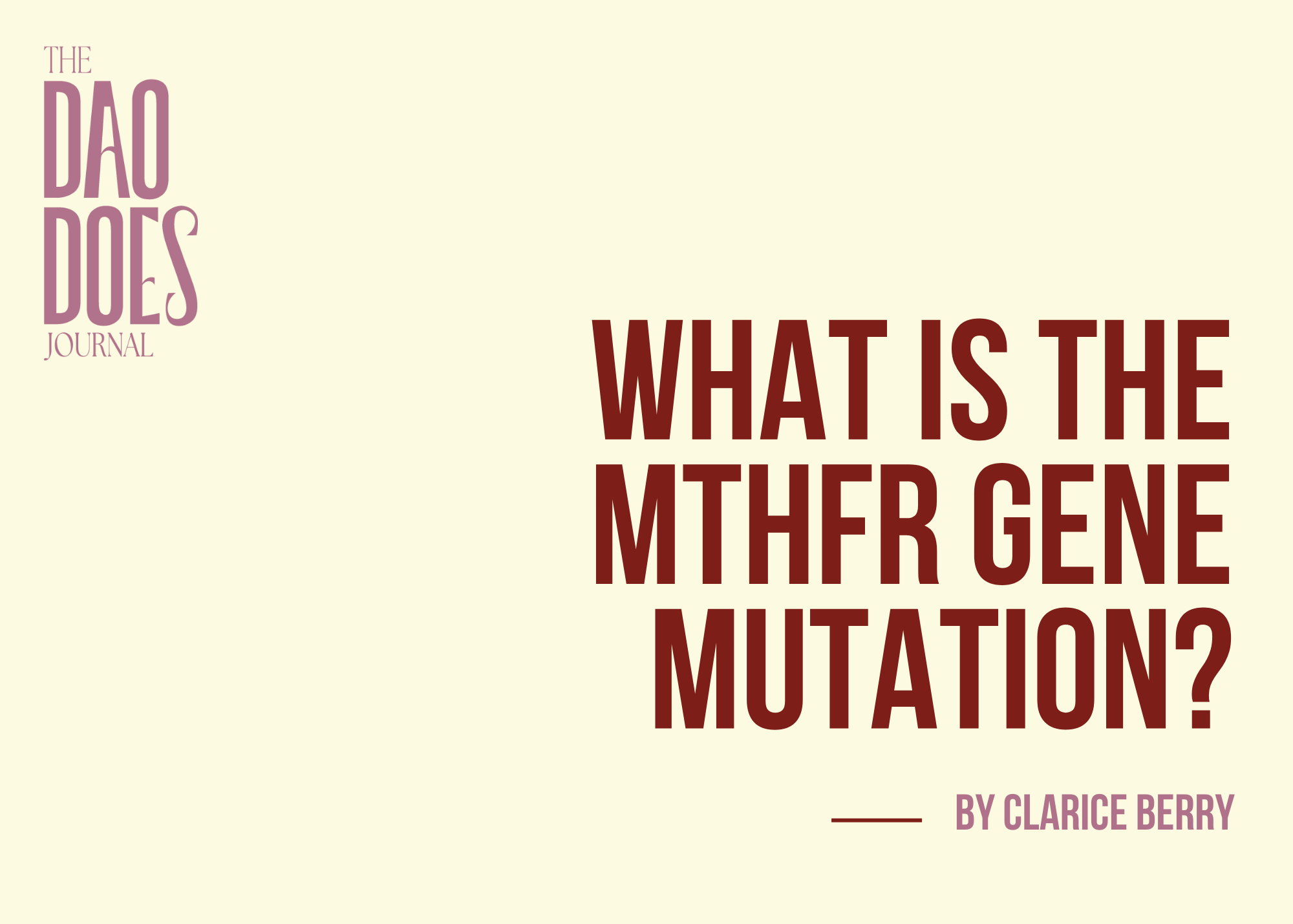The Mysterious MTHFR Mutation – What is it and how can I support my body?
What is folate?
Anyone with one foot in the fertility space understands the importance of adequate folate intake, (amongst other vitamins and minerals, such as iodine) to support proper foetal growth and development during pregnancy. Folate is vitamin B9 and is 1 of the 13 essential vitamins that are unable to be synthesised by the body and therefore must be obtained through dietary sources or supplementation. Dietary sources include egg yolk, beans, whole grains, peanuts, sunflower seeds, liver, citrus fruit, and green leafy vegetables. (1, 2)
Numerous studies have demonstrated that folate deficiency is associated with foetal birth defects, such as neural tube defects like spina bifida and anencephaly; and has also been associated with abnormalities in mothers, including anaemia and peripheral neuropathy. (1) In 2009, the Australian government mandated the fortification of folic acid and iodine in staple foods such as bread and flour to prevent vitamin deficiency diseases amongst the Australian population under the ‘Australian New Zealand Food Standards Code. (2, 3)
However, in 2003, a myriad of health concerns erupted after the discovery of the MTHFR gene mutation or polymorphism (Methylenetetrahydrofolate Reductase) via the Human Genome Project (a large body of research investigating the human genetic code). Since its discovery, some controversy about the clinical relevance of MTHFR polymorphisms has been expressed and some research has linked the genetic mutation with multiple conditions including autism, schizophrenia, cardiac disease, foetal neural tube defects and poor pregnancy outcomes. (7)
What are MTHFR Polymorphisms?
In a nutshell, MTHFR is a crucial gene required for a cascade of chemical and enzyme conversions within the body that allow for the absorption and utilisation of folate. It is also essential for several physiological processes such as creating DNA and RNA, metabolising B vitamins, supporting hormonal detoxification, making healthy red blood cells and protein metabolism. (5)
The MTHFR gene mutation can be active if you receive 1 copy from a parent or two copies from both parents. Approximately 20-40% of the population is affected by one MTHFR gene mutation; which reduces the body’s ability to detoxify, heal from inflammation, produce crucial enzymes, generate neurotransmitters and a reduction of the immune system by 40%. Those who fall in the 4-14% of the population with both copies of the gene mutation; the above functions can be reduced up to 70%. (9)
Folic Acid Supplements Vs Methyl-Folate
Folate is often used as the umbrella term to describe all forms of B-9 vitamins, and whilst the composition of some B-9 vitamins is similar, their conversion and absorption in the body take vastly different pathways.
Naturally occurring folate from dietary sources can take many chemical structures, the most common being, polyglutamate. The body is relatively efficient at converting naturally occurring sources of folate through the small intestine via an enzyme that firstly removes the tail of the glutamate molecule for it to be absorbed, and once absorbed the folate molecules are then transformed into L-5-methyltetrahydrofolate (L-5MTHF); the active form of folate. (8)
Folic acid is a man-made form of folate that does not occur naturally in nature, it is primarily found in fortified foods and supplements (particularly prenatal supplements); it is generally seen as a cheap, more shelf-stable form of folate, which has been oxidised (fewer hydrogen atoms). In contrast to natural folate, which only takes 2-steps to be converted into an active form, folic acid requires 4 steps; namely from folic acid into Dihydrofolate (DHF), Tetrahydrofolate (THF), 5-10 Methylene (THF) and then L-5MTHF (the bio-active form).
Dosages of more than 200mcg of folic acid per day can overload the DHFR enzyme, leading to excess folic acid not being metabolised for several hours in the bloodstream before it’s eliminated. Folic acid is only effective in cases where it can be metabolised, thus those with an MTHFR polymorphism (and lack of the MTHFR enzyme) have a compromised ability to perform the final step in the conversion from 5-10 MTHF to L-5-MTHF; not only does this lead to higher levels of unmetabolised folic acid within the body but lower levels of active folate in the bloodstream. (8)

MTHFR Polymorphism and Homocysteine
Another gene known as the HNMT and a cofactor known as SAMe (S-Adenosyl-L-methionine) rely on MTHFR and the MTHFR enzyme to remove histamine from the body; therefore not only is MTHFR critical for pregnancy and foetal development but for the reduction of homocysteine levels; it is not uncommon for some individuals with an MTHFR polymorphism to have elevated homocysteine levels on pathology analysis and experience histamine intolerances, including allergies, hormonal imbalances, food intolerances and mental health conditions. (9)
Choosing L-5-MTHF Supplements
There is conflicting evidence regarding the clinical relevance of testing for the MTHFR gene and making subsequent dietary and supplement modifications; however, much research indicates that supplements containing the active form of L-5-MTHF are preferred over folic acid-containing supplements as they can be readably absorbed and utilised in the body and raise folate levels in the bloodstream more effectively than folic acid (101, 102, 103). (8)
Therefore, in a clinical setting, I will often prescribe L-5MTHF prenatal vitamins to appropriate patients seeking preconception care and pregnancy support regardless of their known or unknown MTHFR genetic status, as it simply allows the body to utilise and absorb folate readily. Alternate names for L-5MTHF may be listed as Metafolin, Quatrefolic, Levomefolic acid, L-methyl folate, L-5-MTHF, and 5-MTHF). Those with a known MTHFR polymorphism may also benefit from avoiding certain fortified foods that contain folic acid and a diet high in histamine. (8)
(Disclaimer: All dietary and supplement modifications should be discussed with your primary health care physician).
Food for Thought: Postpartum
A wonderful seminar I listened to on the topic of MTHFR presented by Clare Pyers, illuminated a crucial issue surrounding those women seeking fertility and pregnancy support with an MTHFR polymorphism; often these women have near-perfect adherence to correct supplementation and dietary modifications during their fertility journey and up until the birth of their healthy child, but too often forget the significant demands that are required of their own body postpartum (due to increased activities of certain metabolic, hormonal and immune pathways) and the folate demands that their offspring who may also require support for an MTHFR polymorphism.
If you are hoping to find out more, a good Australian website for support on the mystery of the MTHFR mutation is https://mthfrsupport.com.au/
~
#thedaodoes
- Crider K, Bailey L, Berry R. Folic Acid Food Fortification—Its History, Effect, Concerns, and Future Directions. Nutrients. 2011;3(3):370-384.
- Folic acid & iodine fortification, Summary – Australian Institute of Health and Welfare [Internet]. Australian Institute of Health and Welfare. 2022 [cited 28 September 2022]. Available from: https://www.aihw.gov.au/reports/food-nutrition/folic-acid-iodine-fortification/contents/summary
- James A. Greenberg, Stacey J. Bell, Yong Guan, Yan-Hong Yu. Folic acid supplementation and pregnancy: more than just neural tube defect prevention. REPRODUCTIVE ENDOCRINOLOGY. 2017;(34):57-63.
- Murto T, Kallak TK, Hoas A, et al. Folic acid supplementation and methylenetetrahydrofolate reductase (MTHFR) gene variations in relation to in vitro fertilization pregnancy outcome. Acta Obstet Gynecol Scand 2015;94(1):65–71
- https://www.hsph.harvard.edu/nutritionsource/folic-acid/#:~:text=Folate%20helps%20to%20form%20DNA,is%20present%20in%20high%20amounts.
- Murto T, Kallak TK, Hoas A, et al. Folic acid supplementation and methylenetetrahydrofolate reductase (MTHFR) gene variations in relation to in vitro fertilization pregnancy outcome. Acta Obstet Gynecol Scand 2015;94(1):65–71
- https://www.racgp.org.au/afp/2016/april/mthfr-genetic-testing-controversy-and-clinical-imp#:~:text=Due%20to%20the%20large%2C%20varied,pregnancy%20outcomes%20and%20colorectal%20cancer.
- https://www.functionalnutritionanswers.com/folate-vs-folic-acid/
- https://drbeckycampbell.com/mthfr-and-histamine-intolerance-whats-the-connection/

